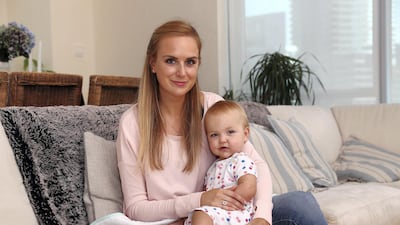When she went on maternity leave shortly before the birth of her first baby, British expatriate Tamsin Foster planned to return to work as an Executive Assistant nine months later.
However, when the time came, Ms Foster, 35, decided she didn’t feel as comfortable as she thought she would about returning to work full time. So, she approached her employers to see if a flexible arrangement could be found.
“In the months before my return to work I began to realise that it was going to be a lot more challenging than I had previously thought," she says. "With my daughter Layla’s routine and bedtime, I was worried that I wouldn’t see her at all during the working week. As my managers stayed in regular contact with me throughout my maternity leave, I was able to initiate a conversation with them to discuss the possibility of working part time.”
Ms Foster works for Legatum, a private investment partnership based in the Dubai International Finance Centre.
“Our goal is to be as accommodating as possible within the bounds of our commercial objectives," says Alan McCormick, a partner at Legatum. "We offer maternity leave in line with the DIFC standards. However, this is dependent on individual circumstances. While we have policies, we choose to take a more relational approach to matters. As parents ourselves, we understand the commitment and support that a family and children need to become the best that they can be.”
With the UAE hoping to become one of the world’s top 25 countries for gender equality by 2021, steps are being taken towards bringing women back into the workplace after having children. Traditionally, it has usually been an all or nothing culture in the country, but employers now realise they are losing out on valuable resources by sticking too rigidly to outdated working practices. There are encouraging signs, however, that this is beginning to change.
Chanelle Murray, also 35 and originally from New Zealand, has been in Dubai for 12 years. She was working as an associate director at Reyl, an independent banking group, when she found out she was pregnant. Initially Ms Murray also planned to return to work full time.
"When I was pregnant I had anticipated returning to work full time," she says. "However, after my son, Charlie was born I realised that I wanted more than two days at the weekend with him.
_____________
Read more:
Women's advocate says females must change approach
Husbands are a handicap, say career-minded Omani women
_____________
"Back home in New Zealand it is common for mothers who return to work to be offered to do so on a part time basis so I decided to approach my boss with my ideal work situation and was fortunate that he agreed to it.”
Ms Foster’s manager, Pasha Bakhtiar, the chief executive at Reyl, says: "We don’t offer flexible working as standard and when someone does work part time there is always an impact but, as a company, you have to anticipate these things to a certain extent. You build this into your overall hiring plan and you can also distribute roles differently, attributing certain tasks to others.”
There are numerous benefits for businesses by thinking a little bit more outside the box when it comes to working patterns, experts say. Louise Karim is the managing director at Mums@Work, a recruitment agency in Dubai focusing on helping mothers return to work after a career break.
"Women who return to work part time after having had children are likely to be incredibly focused as they know they have to get the work done in a smaller amount of time," she says. "Employers are also likely to see a higher retention rate if they offer flexible working. When you invest in people and allow them a greater work life balance they often respond with increased loyalty.”
Nouraa Al Kaabi, Minister of Culture and Knowledge Development, recently called for more flexible working practices at the 19th edition of the Naseba Global WIL Economic Forum. “Companies should look into more flexible policies” she said, adding that “women’s participation in the economy not only boosts development, it diversifies national economies and opens a nation up to new ideas and approaches”.
Mr Bakhtiar also says the benefits of flexible working outweigh the disadvantages. “I believe it is extremely important for mothers to have the option to work flexible hours.
"If this provides mothers with the ability to spend a little more quality time with their children then we will have happier and more motivated people. This will inevitably result is a positive impact for the business as a whole," he says.
"Companies aiming for long term, sustained growth and profitability have to start by focusing on their most important assets, their staff. By providing mothers with the option of keeping their jobs yet spending more time at home everyone wins.”
While some employers may still push back on flexible working, citing trust issues and difficulties around management, the reality is that the world of work is changing.
"Outside of women returning to work after maternity there are also other groups to consider," says Ms Karim. "Millennials are less likely to be happy sitting at a desk from 9 to 5 and so if employers aren’t willing to consider more flexible working practices they are likely to lose out on a huge pool of talent. If employees are picking up their emails at 8 or 9 pm at night, why shouldn’t they get something back?”
Ms Foster is delighted that a solution could be found.
"My days away from the office are about quality time with Layla. I can support the office if need be, but most of the time they manage just fine without me," she says.
"I feel very fortunate to have been welcomed back to an organisation that I love to work for and also have time to be the best mum that I can be to Layla.”

